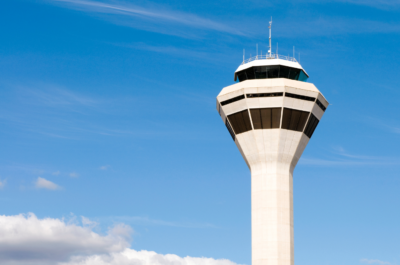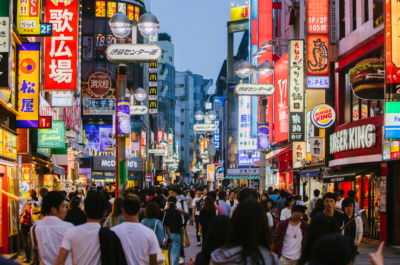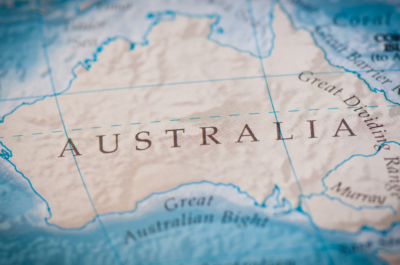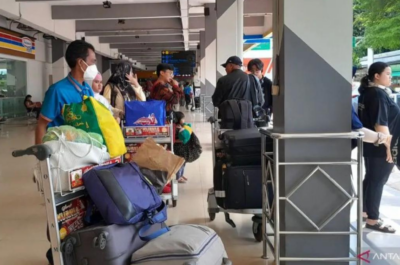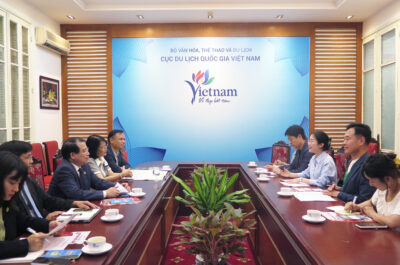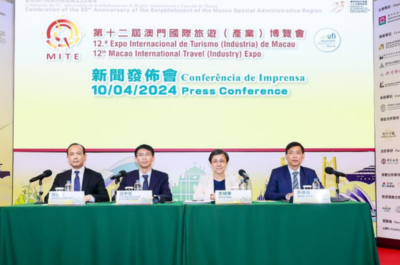…
Professor Geoffrey Lipman, Assistant Secretary General UNWTO, analyzes in TravelDailyNews International the important role tourism industry can play in order to mitigate the climate change of the planet as well as UNWTO’s actions towards greener solutions.
TravelDailyNews: What are UNWTO`s initiatives to mitigate climate change?
Geoffrey Lipman: UNWTO action has to be seen in the global geopolitical decision of the world community to entrust the United Nations with the lead role in responding to Climate Change and constructing a post Kyoto framework for achieving this. UN Secretary General Ban Ki Moon has indicated that he will pursue this goal in a way which is coherent with the Millennium Development Goals – the two fundamental challenges for humanity.
As the Specialized Agency for Tourism, UNWTO is working with other interested agencies like UNEP and ICAO to help integrate Tourism within the overall framework.
In 2003 UNWTO held a Multistakeholder Summit in Djerba Tunisia and developed the Djerba Declaration advising public and private sector players in the Tourism Value Chain how to respond to Climate Change.
In the light of more recent studies from Scientists and Economists, UNWTO, working with UNEP and other agencies has set in train a series of events to update the Djerba Declaration and create a coherent mechanism for Tourism input to the evolving UN framework. In October; a Multistakeholder Conference in Davos with the support of the World Economic Forum and the Swiss Government.
In November a Tourism Ministerial in London with the support of the World Travel Market and the UK Government, as well as our own General Assembly in Cartagena, Colombia. These are particularly focused on the UN Secretary General’s position for the UNFCC negotiations in Bali at the end of the year.
TDN: How can poverty alleviation through tourism help the environment?
G. L.: The issue is not how poverty alleviation can help the environment, but rather how can one ensure that there are coherent strategies for sustainable tourism in its broadest sense and poverty elimination in accordance with the global priorities established in the Millennium Development Goals.
These Goals are a pledge by the world community to attack a substantial number of fundamental problems in poor countries with defined targets to be achieved by 2015.
At the time the world leaders were drawing up the MDGs – the turn of the century, hence the name – the environmental framework was the so called triple bottom line balancing – ecological, economic and social dimensions, with a focus on local community based initiatives to build the link between sustainability and poverty. (In the past 5 years the climate change dimension has emerged as a new priority, with enough significance to talk now of quadruple bottom line balancing – but the principles remain the same).
They recognized that Ecotourism was one of the key products to help on the supply side because so many poor countries have nature and culture and tradition as key parts of their tourism offer. And on the demand side the idea of responsible tourism emerged – a category of travelers whose social conscience would attract and encourage them to seek out ecotourism and community based destinations. Add to that mix companies with a new corporate social responsibility mindset and financing institutions that suddenly recognize this kind of tourism as a strong development catalyst and a new cycle of market based poverty reduction activities.
For UNWTO, we created a leadership initiative called ST-EP: Sustainable Tourism for the Elimination of Poverty designed to advance this kind of thinking and to promote projects and funding, particularly in sub Saharan Africa where the poverty problems and the ecotourism potential are so evident. To date some 45 projects with $2million of funding have been initiated and a foundation established in Korea to realize more funds.
TDN: Greener policies and economic development. Are these two possible to be combined and how?
G. L.: The key point here is that “greener policies” are now inevitable as well as desirable because of the new climate driven public and political realities. The question is how can they relate to continuing economic development generally and priority economic focus on the world’s poorest countries.
The reality is that there are already a whole range of “green” products – branded as ecotourism, responsible tourism, community tourism etc targeted in many cases at the world’s poorest countries. Frankly we can expect a big boost for these in the next few years and an expansion tied to both climate change and poverty strategies of the development institutions and of the marketplace. This will also boost the support and service for these products, creating a virtuous circle of growth and sustainability.
Given that tourism represents the largest export for most of the world’s poor countries, that distribution will become relatively cheap due to the internet and that tourists directly inject foreign exchange into the communities they visit then this is a very attractive option for development agencies.
TDN: Countries where tourism development is a driving force of the economy take no strict measures against greenhouse effect. What are UNWTO’s actions regarding this?
G. L.: UNWTO is not an enforcement Agency – we help Tourism Stakeholders in the Public and Private sector develop and apply policies for ethical and sustainable tourism. As the Nation States within the UN System create a framework for a post Kyoto climate change response they will have to decide issues relating to targets and enforcement – including carbon trading schemes.
As a result of its Davos, London and Cartagena meetings UNWTO will develop input strategies to look to new vehicles to assist States in their efforts to mitigate, adapt, embrace new technologies and secure financing for tourism sector response. I can envision codes of conduct and voluntary agreements rather like the UNWTO Global Code of Ethics…but I can’t envision any sort of mandatory regulation.
Nor should UNWTO’s voluntary initiatives be underestimated – our Global Code of Ethics for Tourism – the basis for responsible/sustainable Tourism – has been endorsed by the UN General Assembly and increasingly incorporated into national regulation and legislation; our Tourism Satellite Account – the standards for measuring the economic impact of the sector – is part of the UN Statistical structure and increasingly reflected in National Accounting Systems. With 150 Member states and 350 private sector Affiliates from business, academia and civil society we have a capacity to project sound policies globally.
TDN: How does tourism activity affect climate changes on the planet and how do these changes affect the tourism industry?
G. L.: The Secretary General of UNWTO Francesco Frangialli has made the point that Tourism is a victim and a vector of climate change. As a Victim he has identified four distinct areas
- Small islands and Coastal Strips where rising sea levels are the primary concern
- Water and Deserts where increasing water scarcity will dramatically extend desertification and drought
- Forests and Biodiversity where reduction in species is already apparent and deforestation is directly reducing the global carbon sink
- Snow and Glaciers where mountain resorts are disappearing
As an overview point, he notes that much of tourism development in recent years has served to regenerate rural regions and that this development is under serious threat of reversal.
As to the Vector he points to the overriding significance of the transport sector generally and of air transport specifically. He notes that while air transport is estimated at 2 to 3% of overall greenhouse gas emissions it is forecast to rise due to the absence of alternative fuels and the strength of predicted demand. At the same time it is a vital lifeline for the poorest countries and for small island states.
Tourism will have to do the same as other sectors of the economy: adapt – change its operating patterns: mitigate – by reducing or offsetting its carbon emissions and modernize – by embracing new carbon friendly technologies.
TDN: Climate changes can gradually destroy traditional summer and winter destinations and create new ones. Do you agree on this and if yes how the tourism industry should react?
G. L.: Yes it is already doing so – some coastal resorts and islands are already under threat from rising sea levels and some ski areas have lost their snow…because tourism is now such a fundamental part of local economies the authorities are hard at work to develop alternative products or to reinforce their existing ones through innovation and adaptation.
Ski resorts in the Alps for example are buying more and more artificial snow making equipment, introducing ice skating and other pastimes. States are establishing new regulations to prohibit construction close to shorelines and to re-deploy facilities on higher ground. In South East Asia for example this was part of the post Tsunami reconstruction.
This has to be the pattern going forward.
TDN: On the one hand organizations such as EU seek to reduce CO2 emissions and on the other hand air travel is constantly increasing especially in Asia. How is it possible for a viable solution to be found?
G. L.: Having spent the first 20 years of my working life in IATA, the airline trade organization I am very optimistic as to the future of air transport which has a proud record of responding to crisis. UNWTO believes that there will be and should be a range of solutions to the air transport carbon challenge
- New airframe and engine technology will substantially reduce emission levels – IATA’s Director General has called for a zero footprint aircraft by 2050 and we support this call. Older less fuel efficient aircraft can be retired early.
- Shorter and straighter air routes can reduce fuel burn – this is within the capability of governments to agree today.
- Emission trading schemes where airlines pay for their higher emissions by purchasing allocations from low emission entities and carbon offset mechanism’s where users pay for their emissions and the money is invested in carbon reduction projects.
- Some short haul routes can be more efficiently operated by high speed rail from a carbon perspective.
- Fiscal policies can be used to encourage discipline amongst airline operators – including incentives for surpassing standards and penalties for failing to meet them.
Two fundamental points should be noted
- airlines should not be exempt from global carbon reduction strategies and if the above programs fail to meet fair and reasonable criteria then flight reductions will eventually have to be contemplated
- Any such reductions or other penalty contemplated should not include operations to or from the world’s poorest countries whose carbon footprint is minimal and whose tourism development prospects should not be threatened
TDN: Is it enough for UNWTO only to encourage transport companies, hoteliers, tour operators, travel agents and tourist guides, to adjust their activities, using more energy efficient and cleaner technologies and logistics, in order to minimize as much as possible their contribution to climate change? According to your opinion, should the official body of the tourism industry take more drastic measures or give more motivation towards a greener environment? What would these measures be?
G. L.: As indicated above I do not believe the UNWTO has a mandate from its members or the international community to do more than create facilitative and encouraging mechanisms for climate response. These might include standards, indicators or badging programs, as well as creating registers of good practice, climate alliances or compacts.
TDN: As tourism grows globally more hotels and air carriers make their appearance. How can this unprecedented growth tourism is facing be tuned with the protection of the environment?
G. L.: For 15 years since attending the Rio Earth summit in 1992 I have argued from public and private sector platforms that the key to the long term economic health and beneficial socio-political contribution of the sector is to put sustainability at the core of all tourism strategies and to take the implementation away from PR Directors and into Boards of Directors. And that genuine public/private collaboration is needed to make this happen, not lip service.
It has been my belief that well planned transport, accommodation and travel services – subject to measurable capacity constraints and operating on triple bottom line sustainability principles have a substantial space for expansion around the globe – and particularly in the poorest countries.
The climate imperative has forced this sustainability driven thinking to become mainstream – with quadruple bottom line as the new standard. If it is methodically and rigorously applied it will be the safeguard for balance growth.
I’m delighted to be able to play a part in the UNWTO leadership initiatives in this area and to have had the opportunity to help Francesco Frangialli realize his vision for the Organization and this vibrant industry.


























































